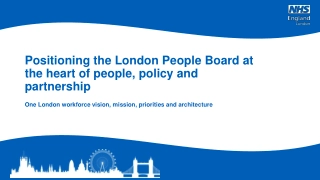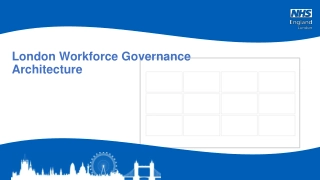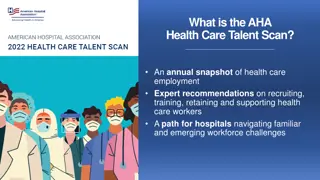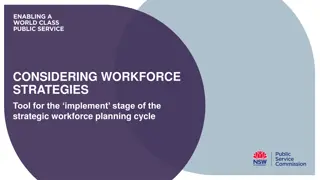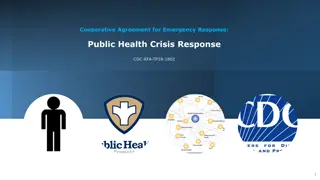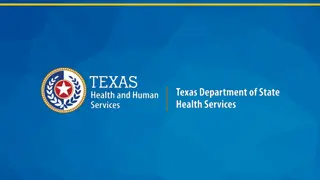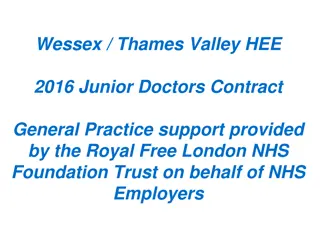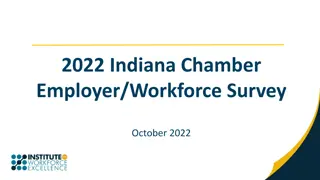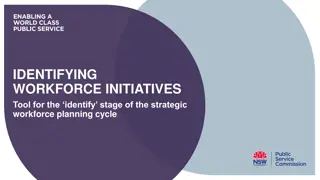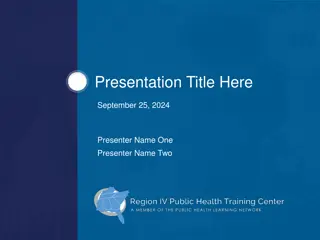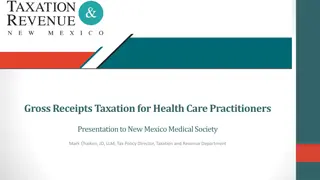Understanding the Role of Public Health Practitioners in London's Workforce Development
Public Health Practitioners (PHPs) play a crucial role in implementing and delivering public health services, programs, and interventions. They focus on promoting health and wellbeing within communities, addressing health inequalities, and protecting the public from environmental hazards. Learn about the Level 6 Public Health Practitioner (L6.PHP) apprenticeship program in London, its benefits for employers and apprentices, and how to recruit L6.PHP apprentices effectively. Explore the diverse family of public health apprenticeships and the essential skills and competencies required for PHPs.
Uploaded on Sep 12, 2024 | 0 Views
Download Presentation

Please find below an Image/Link to download the presentation.
The content on the website is provided AS IS for your information and personal use only. It may not be sold, licensed, or shared on other websites without obtaining consent from the author. Download presentation by click this link. If you encounter any issues during the download, it is possible that the publisher has removed the file from their server.
E N D
Presentation Transcript
Level 6 Public Health Practitioner (L6 PHP) Apprenticeship London employer toolkit for recruiting apprentices London Workforce Development Team
Purpose of this document Provide an outline of the level 6 public health practitioner (L6 PHP) apprenticeship. Highlight the benefits of implementing L6 PHP Apprenticeship from the perspective of employers and apprentices. Provide a high-level summary of the Salisbury Procurement Framework s list of selected training providers and the procurement procedure. Provide advice and guidance on the recruitment of a L6 PHP apprentice Signpost employers to a wide range of support information, tools and resources and points of contact for queries and concerns.
Family of public health apprenticeships Public Health Practitioner Level 6 Community Health Wellbeing Worker Level 3 Environmental Health Practitioner Level 6 Health Care Intelligence Specialist Level 7 Specialist, Community and Public Health Nurse Level 7 Systems Thinking Practitioner Level 7 Specialist, Community and Public Health Nurse Level 7 Community Health & Wellbeing Worker Level 3 Environmental Health Practitioner Level 6 Health & Care Intelligence Specialist Level 7 Public Health Practitioner Level 6 Systems Thinking Practitioner Level 7 Funding band: Funding band: Funding band: Funding band: 13,000 Funding band: Funding band: 18,000 Funding band: 7,000 7,000 Funding band: 22,000 22,000 Funding band: 17,000 17,000 Funding band: 20,000 20,000 Three year One year Four year Three year 18 month programme 30 month programme Three year programme programme One year programme programme Four year programme programme Three year programme programme
What is a Public Health Practitioner? Public Health Practitioners (PHPs) make up the core public health workforce that leads on the implementation and delivery of public health services, programmes and interventions, translating public health vision, strategy and policy into operational deliverables. The focus of the work is most often in relation to groups, communities and populations, rather than in one-to-one situations with service users, though this may be the case in some roles. They monitor and promote health and wellbeing to ensure fairer health outcomes between different communities and groups (health inequalities). They put in place protection measures to protect the public from environmental hazards and risks. They evaluate sources of evidence, interpret it and design and plan health interventions. People who work as PHPs are also drawn from a wide range of backgrounds and since 2011 the UKPHR has developed a professional voluntary register for PHPs that defines their shared occupational competence.
Overview of L6 PHP apprenticeship L6 PHP apprenticeship characteristics The L6 PHP apprenticeship standard was approved by the Institute of Apprenticeships and Technical Education in November 2019. It lists a series of occupation duties and knowledge, skills and behaviours for the apprentice to develop throughout the programme Apprenticeship Standard Apprenticeship levy The Institute has approved an upper limit of 20,000 levy funding for this standard. This is available to organisations with an apprenticeship levy for training only, excluding other expenses such as salary and travelling. Levy transfers are also available for those who do not have access to an organisational apprenticeship levy. Integrated degree apprenticeship. Apprentices obtain BSc in Public Health once successfully completing the programme This programme aligns to UKPHR s practitioner standards. Apprentices are eligible for practitioner registration on completion (subject to UKPHR s application and verification requirements) Qualification Professional recognition Immunisation Programme Co-ordinator Accident Prevention Officer Community Development Worker Community Engagement Officer Public Health Project Manager Health and Wellbeing Co-ordinator Typical job titles might include Minimum 3 years + 3 month end point assessment 80% learning on the job; minimum 20% of off-the-job training Public Health Practitioner Health Protection Practitioner Health Improvement Practitioner Public Health Intelligence Officer Public Health Data Analyst Tobacco Control Lead Workplace Health Advisor Programme structure Eligibility criteria Should not already have a BSc in Public Health or similar It is advised that apprentices should have level 2 English and Maths (GCSE) before starting the programme. If not, they must obtain these prior to taking the End-Point Assessment
Successes of the programme so far in London Apprentices experience Coventry very supportive, got a high grade in first assignment (out of education 10 years+) Loving my job and understand the impact my work has on the population. Getting high grades in all assignments, which was a struggle during GCSEs I am currently working in substance misuse and health protection, these are really interesting pieces of work which I am enjoying The apprenticeship is quite stressful and there is a lot of pressure Difficult getting a work/life balance, university work takes up most free time This apprenticeship programme has offered: 1. New development opportunities, either for those in existing positions in their organisations, or to attract new talent to their team or organisation. 2. The opportunity to build capacity and resilience within their services by growing their own workforce. 3. New opportunities to individuals who may not otherwise access university education, seeking to redress inequalities that might prevail in their local communities and economies Employers experience There has been good support and communication from Coventry. Course is well-structed and organised UEL were responsive and supportive of any issues we experienced Time consuming paperwork for line manager/mentor to complete which could be simplified. There is a lot of information and understanding required for the line manager/mentor Fantastic opportunity for people to get into public health, feels great supporting the next generation of public health practitioners 4. Apprentices who are immediately employable by a range of employers providing both essential and transferable knowledge and skills.
Components of the apprenticeship standard All apprenticeship standards are made up of the following components: 1. The occupational standard which contains the duties, performance criteria, knowledge, skills and behaviours for the occupation which the apprentice needs to learn by the end of their apprenticeship. 2. The assessment plan (or end point assessment (EPA)), which describes at least 2 methods of assessment that have to be successfully completed by the apprentice. The assessment plan also describes the EPA gateway. The gateway is the transition from the training and development phase to the end point assessment. At this point, the employer determines whether the apprentice is ready. The 14 duties set out in the PHP standard reflect the functions described in the UK Public Health Skills and Knowledge Framework and the associated descriptors for professional and ethical practice. The knowledge, skills and behaviours are what the apprentice will be graded on in the EPA. All the KSBs must be met by the apprentice, evidenced and assessed in order to pass their apprenticeship. If they fail just one part of the KSB, they will fail the entire EPA. It is essential that employers fully understand the KSBs within the PHP apprenticeship standard to ensure you can provide adequate experience for each KSB either in the workplace or with a placement. L6 Public Health Practitioner Standard.
End-Point Assessment (EPA) Overview of End-Point Assessment (EPA) The EPA consists of 2 discrete assessment methods. Assessment method 1: Presentation of practice with question and answer session Graded: fail/pass/distinction Assessment method 2: Scenario-based situational judgement test Graded: fail/pass Assessment Methods Typically lasts for 3 months following the completion of the apprenticeship programme. Duration The gateway is the transition from the training and development phase to the EPA and requires the following requirements: Employer is satisfied the apprentice is consistently working at, or above, the level of the occupational standard. English/Mathematics Level 2 Apprentices must complete the following approved qualifications mandated in the standard: Achievement of 330 credits of the integrated BSc (Hons) degree in BSc (Hons) Public Health, or BSc (Hons) Public Health and Health Promotion, or BSc (Hons) Health and Wellbeing from the on-programme apprenticeship formally confirmed prior to the Gateway progression. (The final 30 credits of the degree will be attributed to end- point assessment) Apprentice to submit a portfolio of evidence to the EPAO EPA Gateway EPA Plan End-point assessment plan for the Public Health Practitioner (Integrated Degree) apprenticeship standard at level 6
Roles and responsibilities The key to a successful outcome for a student apprentice is an effective tripartite relationship between the student apprentice, the line manager/ workplace mentor and the training provider. Each has their respective roles and responsibilities within the Apprenticeship relationship.
Role and responsibility of the apprentice Keeping their Personal Tutor informed of changes to their personal/professional circumstances that might affect their progression on the programme, in order to provide or signpost to relevant support services in a timely way, as necessary. Participating in and completing learning activities, research and assessments to develop skills, knowledge and behaviours, update evidence requirements and successfully progress through the programme. Demonstrating and submitting evidence of performance, knowledge and competence of all programme components and uploading completed work to a portfolio. Attending all meetings, workshops, seminars and tutorial events as agreed with their Personal Tutor and Course Director. Source: Coventry University
Role and responsibility of the line manager Support the identification of their apprentice s training needs, setting objectives and targets appropriate to the apprentice s learning and workplace role and responsibilities Participate and contributing to programme progress reviews for the apprentice (approximately every 12 weeks) Identify opportunities for their apprentice to develop within the workplace Provide regular feedback on performance at 1:1 s or supervision meetings Ensure effective planning of the apprentice s workload so there is sufficient time dedicated to meet the 20% off the job training/learning requirement Arrange for training, mentoring and support during modules as required for the apprentice Meet regularly with your apprentice to discuss their progress on the programme Write up expert witness testimonies of competence if required Source: Coventry University
Role and responsibility of the workplace mentor Contribute to progress reviews of your apprentice as and when required Guide your apprentice in making connections between academic learning and applying to learning at work Support the line managers and apprentice to identify training needs of your apprentice in a Personal Development Plan Identify opportunities for your apprentice to apply their learning in the workplace Provide coaching and mentoring to your apprentice on a 1:1 basis related to programme content Submit expert witness testimonies, when required Give advice and guidance to your apprentice on workplace specific tasks Source: Coventry University
Role and responsibility of the personal tutor/training provider Facilitate the apprentice identification of any additional learning and/or support needs Explain the online learning systems and assessment process Clarify the main policies and procedures relevant to the programme (e.g. Academic Regulations including Appeals and Plagiarism) Organise meaningful learning activities, agreeing and delivering a programme of training and learning sessions with the student apprentice Carry out assessments to support progress Provide feedback on assessments Give constructive feedback on progress to the participant, workplace mentor and Line Manager Prepare and support the apprentice in readiness for the Gateway phase of the programme Support the apprentice s readiness for the End Point Assessment (EPA) Source: Coventry University
Placements If you feel there are some areas of the standard which you will not be able to provide the appropriate workplace experience, you could consider looking into organising a placement for your apprentice. Contact organisations in your local area or organisations that already have a public health practitioner apprentice to investigate organising a placement for your apprentice. Ensure you have a discussion with the personal tutor/training provider about the proposed placement and its suitability to meet the specific area of the standard.
National procurement for L6 PHP apprenticeship training providers A national procurement exercise took place in 2020 by The Salisbury Managed Procurement framework resulting in eight training providers across England successfully meeting the required standards. This framework is open to all public sector organisations. London employers are advised to use this procurement framework. However, employers can undertake their own procurement to appoint a training provider that is not selected through the Salisbury Managed Procurement to satisfy their training needs. Benefits of working off the national procurement framework It is a simple process to establish a contract with your training provider through the framework with no additional procurement beyond this framework. You will be protected and supported by the framework s contract with the provider if any issues arise while your apprentice is on their programme.
L6 PHP training providers on the Salisbury Managed Procurement framework University of Sunderland Recurring September start University of Salford Recurring January start Coventry University Recurring January start National offer University of East London Recurring January start Recurring September start University of the West of England Recurring September start National offer Source: Hannah Burn, OHID National PH Workforce 16
Recommended training providers for London employers Training provider Cohort start Programme lead Contact Minimum number of apprentices required? Yes - 15 Teaching model Base Coventry University Yearly January start Jane Wright ad2276@coven try.ac.uk 1 day F2F and 2 days online each month Coventry also have a London campus which they could deliver at if minimum cohort number is achieved for London based apprentices. University of the West of England Yearly September start Luke Midgley luke.midgley@u we.ac.uk No Fully remote teaching The list above is not compulsory. London employers can use and procure their own training provider.
Recruitment options for a new apprenticeship post in your team Complete the regular HR procedures to set up a new post. This includes: setting up JD and grade to be evaluated by HR (example JDs for L6 PHP apprenticeships available) Establish new position in your team Convert current vacancy into an apprenticeship post Use a current vacancy in your establishment and convert into a apprenticeship post. Use post with a similar grade or grade higher to cover funding for apprenticeships +1 years Is there a member of your team who might not have a formal qualification in public health? The apprenticeship programme could be used as a professional development opportunity Enrol existing staff member onto programme
Recruitment Process The high-level diagram below outlines step-by-step recruitment process of a L6 PHP apprentice. Please note that recruitment process may vary due to the organisational structure and recruitment processes in your organisation. Identify your apprenticeship lead and work with HR to sign off the apprenticeship implementation process Select and appoint the successful candidate Carry out the interview Work with your training provider for shortlisting questions and/or meeting candidates in interviews Identify/create a vacancy (3-year fixed term) to be used as the apprentice post Prepare for the interview Give feedback to unsuccessful candidate Allow leeway on contract for possible extension due to personal circumstances or assessment retakes Create the apprenticeship agreement and commitment statement Set up the person specification and job description Advertise the apprenticeship vacancy Work with your training provider Complete a local HR business case process to finalise the apprentice post Notify your training provider of successful recruitment and identify start date Establish the salary cost for an apprentice See Salary for tips
Salary There is no identified salary range for a L6 PHP apprentice. Employers need to establish the salary range with discretion. Some points for consideration may include: The local economy and living costs Available resource and budget within your department/organisation Employers must pay at least the national minimum wage for apprenticeships, which is 4.81 per hour. An average salary for a PHP apprentice in London - 25, 287
Mobilising for your new apprentice Prior to appointing your successful candidate, ensure they meet all the requirements of the apprenticeship programme, confirm this with your university Agree apprentice s start date and complete the standard induction processes for your team Complete all HR processes to establish new apprentice post in your team Apprentice starts their induction week at the university Commence ASAP (minimum 4-6 month leading time) University start date Appoint successful candidate and complete their HR checks for their contract. Complete their application form for the university to confirm their place on the programme. Send off URN form to Salisbury Procurement Work with the line manager and mentor of the apprentice to establish their workplan for the first module Recruit an apprentice to your post (advert, shortlisting applicants, interviews) Express interest for recruiting an apprentice to the university
Further support Resources Public Health Practitioner (integrated degree) apprenticeship at level 6 implementation guidance for employers, training providers, and apprentices The HASO Apprenticeship Implementation Toolkit is designed to support you through the process, end to end, from setting out your organisational strategy right through to when your apprentices are with you in the workplace. Apprenticeship.gov.uk provides a quick summary on using Apprenticeship Levy to fund an apprenticeship for employers with a pay bill of more than 3m. GOV.UK provides a quick summary on Levy Transfer for employers with a pay bill of 3m or less to access full apprenticeship funding. National Apprenticeship Service produces an employer guide to encourage good practice in all aspects of the recruitment of apprentices, promoting equality and diversity and complying with the relevant legislation.
Points of Contact For apprenticeship/apprenticeship levy enquiries: Jennie Stone - London Regional Apprenticeship Relationship Manager, NHSE jennifer.stone@hee.nhs.uk For enquiries about procurement of training providers: Simon Dennis - Strategic Commercial Manager, Salisbury NHS Foundation Trust simon.dennis@nhs.net For general enquiries OHID London Workforce Development Team ohidlondonworkforce@dhsc.gov.uk


